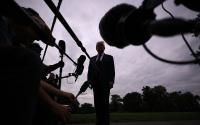24 January 2005The Register Guard
Once again the Bush administration is trying to impose its "What, me worry?" attitude toward climate change on the rest of the world.
Last November, Bush administration officials squelched an effort by Arctic nations to endorse mandatory carbon controls to counter global warming. Now, the administration is trying to purge a United Nations action plan of all references to climate change as a potential cause of future natural calamities.
For the Bush administration, global warming has become a matter of political will over flashing red-light reality. Driven by a toxic blend of denial, subservience to industry and ideological distrust of apolitical, fact-based science, Bush already is signaling that he intends to spend the next four years dragging his feet on this most critical of issues.
If this sounds familiar, it's because it's the same way the president spent his first term. During his 2000 campaign, Bush pledged regulatory controls on carbon dioxide emissions. After the election, he flip-flopped, rejecting the Kyoto Protocol approach to climate change. Even in the face of administration's own scientific reports blaming carbon dioxide and other greenhouse gases for global warming, the Bush White House continued to insist the evidence was inconclusive and did not warrant action.
Last year, the White House shifted its strategy. The U.S. secretaries of commerce and energy and the president's own science adviser signed a report to Congress acknowledging that warming trends cannot be attributed solely to natural factors and that carbon dioxide and other heat-trapping gases play a significant role. But the report also insisted there was no solid evidence supporting the need for regulatory action.
The White House put this delaying strategy to work last November, when it successfully lobbied members of the Arctic Council - a group of eight nations, including the United States, that have Arctic territories - to kill an aggressive policy statement calling for mandatory limits on carbon dioxide emissions.
Last week, the U.S. delegation to the World Conference on Disaster Reduction lobbied for the deletion of all references to climate change from a new U.N. action plan on natural disasters. It did so despite the recent conclusion of the Intergovernmental Panel on Climate Change, a U.N.-organized network of scientists, that global warming will cause more extreme weather events, including hurricanes and droughts, in the decades to come.
Meanwhile, the administration is doing its best to impose its political will on the scientific community at home.
According to The Washington Post, James Hansen, head of NASA's Goddard Institute for Space Studies, accused a senior administration official of trying to block him from discussing the dangerous effects of global warning. And Bush's top science adviser, John Marburger, has warned researchers that they risk losing their federal funding if they publicly oppose administration poli- cies.
As the administration tries to force scientists to bend to its political will, the buildup of climate-changing gases continues, with the United States spewing an astonishing one third of the world's total. Scientists warn that Arctic sea ice is melting at an alarming rate and that it could be reduced by one-half as soon as the end of this century, causing severe disruptions that range from the extinction of animal and plant species to flooding in coastal regions across the globe.
The Bush administration should stop denying the severity of global warming and forcing scientists to bend to its political perspective. It should acknowledge the weight of evidence supporting a conclusion that global warming is a reality - one that will be the most pressing environmental issue for decades to come and one that will affect the lives of everyone on Earth.
A crisis of such magnitude requires a comprehensive, truly global strategy. The rest of the world already has begun the fight, with more than 120 nations ratifying the Kyoto treaty. But the United States - and the Bush administration - are still missing in action.






